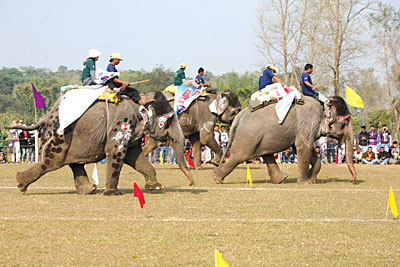 KIRAN PANDAY |
Whatever you are doing on new year's eve, if you look back honestly on 2010, it's hard to miss a sense of collective failure as a nation. The year has been marked by political wrangling above all else, and the extension of the Constituent Assembly has not, to date, advanced the cause of the constitution to come. If there was hope that the political parties were close to reaching an agreement on power-sharing, the constitution, and integration of the Maoist ex-combatants, the latter's Palungtar plenum has dampened it. It appears we are back to square one, and Girija Prasad Koirala, for all his faults, is missed sorely in the attempts to forge the consensus that is needed to move on.
2010 had more than its fair share of scandals, high-profile assassinations, air and road accidents, and natural disasters. There was plenty that was bad and ugly. But there was some good, too, that owed much to initiatives led by remarkable Nepalis. Anuradha Koirala became CNN Hero of the Year for her work with Maiti Nepal. Shrikrishna Upadhyay won the Right Livelihoods Award for his work with SAPPROS. Against all odds, Nepal's women cricket and football teams continued to shine.
More quality books were published, movies made, and music released than ever before, and 2010 morphed into a year for festivals � jazz, blues, theatre, the environment, the arts, poetry � that underlined the creative potential of Nepalis. If nothing else, we can look forward to more of the same next year.
There is a justifiable tendency for some to dismiss such achievements as irrelevant in the face of the daunting challenges Nepal faces in concluding the peace process and drafting a constitution that will set up a level playing field for all the peoples of this nation. But if we are to meet these collective challenges, and spur those making decisions on our behalf to do so, then individual and social endeavour of this sort serves to demonstrate that if only we put our minds to it, anything is possible.
It's not about replicating Kathmandu's cultural and social ferment elsewhere. If we didn't know already, Elinor Ostrom, winner of the Nobel Memorial Prize for Economic Sciences, visited Nepal this year and reiterated the capacity of rural Nepali communities to manage their resources efficiently and equitably. The capital enjoys its own advantages. If we manage to facilitate the same in towns and villages across the country (and document what is already happening), then 2011 is certainly worth looking forward to.
READ ALSO:
Untying the knot, DAMAKANT JAYSHI
An exclusive interview with Maoist Chairman Pushpa Kamal Dahal


